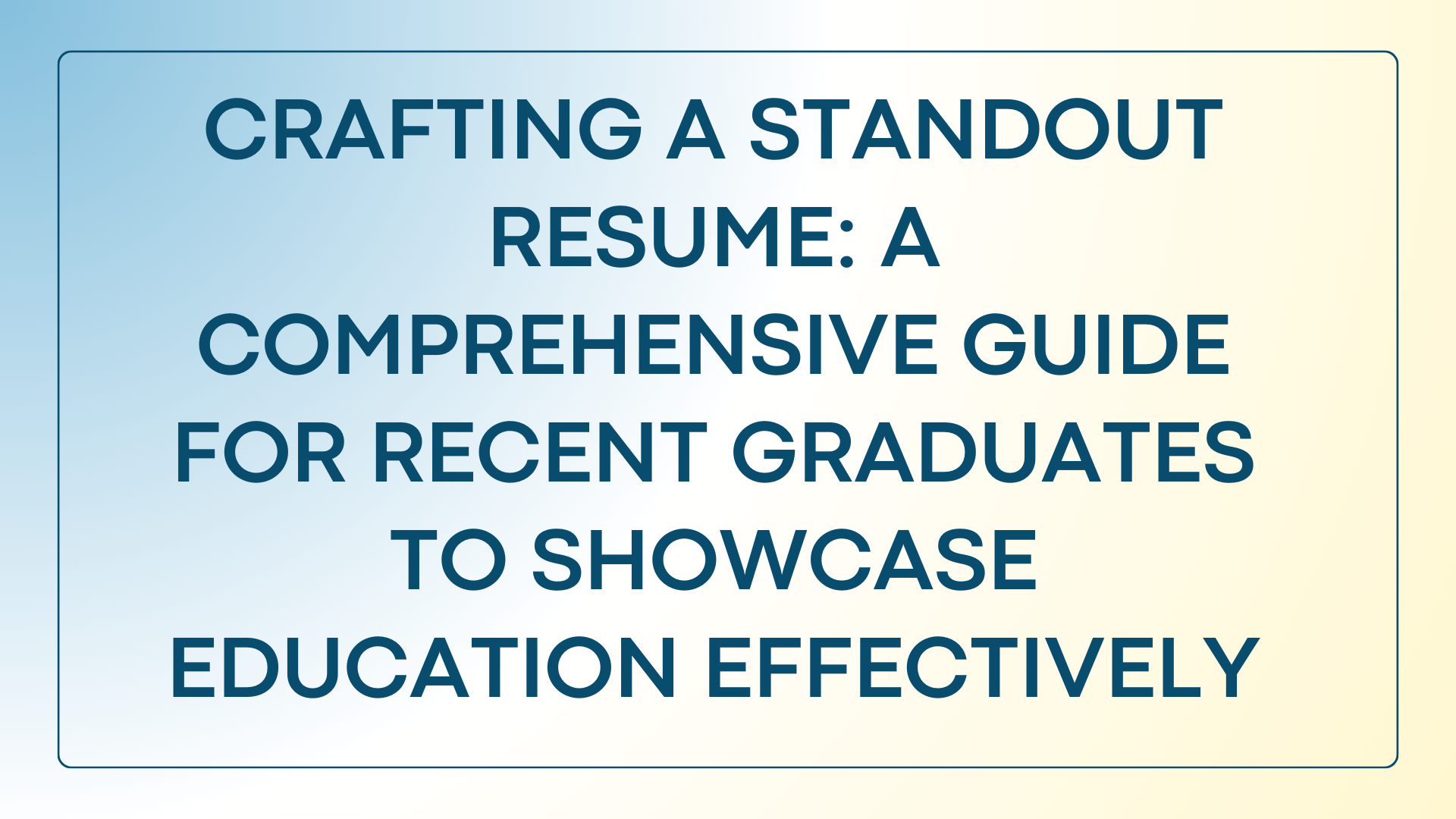Introduction: Congratulations, recent graduate! You've conquered the academic challenges and earned your degree. Now, it's time to step into the prof
Introduction:
Congratulations, recent graduate! You’ve conquered the academic challenges and earned your degree. Now, it’s time to step into the professional world. Crafting an effective resume is crucial for making a strong first impression on potential employers. One key element that can set you apart is how you showcase your education. In this guide, we’ll explore strategies for recent graduates to effectively highlight their educational achievements on a resume. If you’re ready to embark on this journey, let’s dive in.
Create a Resume for Fresher – Crafting a resume for fresh graduates requires a thoughtful approach. Your resume is not just a document; it’s a personal marketing tool. To create a resume that stands out, follow the tips and techniques outlined in this guide.
1. Prioritizing Relevance in Resume Construction:
Commencing the resume-building process requires a strategic approach. Begin by prioritizing relevant information, focusing on your educational details such as degree, major, university, graduation date, and academic honors. Placing this information at the forefront ensures that recruiters swiftly recognize your educational background.
2. Establishing a Strong Education Section:
Devote a distinct section to education, typically titled “Education” or “Academic Background.” Organize your degrees in reverse chronological order, starting with the most recent. Include crucial details such as the degree earned, major, university, graduation date, and noteworthy GPA.
3. Showcasing Academic Achievements:
Recent graduates should highlight any academic honors, scholarships, or significant achievements. These accomplishments provide tangible evidence of your dedication and competence, offering valuable insights to potential employers.
4. Featuring Relevant Coursework:
In fields where coursework is particularly relevant, consider adding a subsection to showcase pertinent courses. This gives employers a glimpse into your academic focus and the specific skills you’ve acquired during your studies.
5. Incorporating Capstone Projects and Internships:
Include significant capstone projects or internships in your resume. Demonstrating practical experience alongside theoretical knowledge adds depth, portraying you as a candidate ready for the challenges of the professional world.
6. Quantifying Achievements for Impact:
Where applicable, quantify your academic achievements. Whether it’s completing projects ahead of schedule, achieving the highest grade in a challenging course, or successfully leading a team project, numbers lend credibility and offer a tangible sense of your capabilities.
7. Tailoring Your Resume to Each Job:
Customize your resume for each job application by emphasizing elements of your education that align with the specific job requirements. Tailoring your resume showcases a keen understanding of the position and makes your application more appealing to employers.
8. Utilizing Strong Action Verbs:
Make your academic experiences and achievements stand out by employing strong action verbs. Starting bullet points with words like “developed,” “implemented,” “analyzed,” or “managed” conveys proactivity and accomplishment, enhancing your resume’s impact.
9. Incorporating Industry Keywords:
Optimize your resume for applicant tracking systems (ATS) by incorporating relevant keywords from the job description. ATS scans resumes for specific terms, and integrating industry-related keywords increases the likelihood of your resume getting noticed.
10. Developing a LinkedIn Profile:
Include a link to your comprehensive LinkedIn profile on your resume. Ensure your LinkedIn profile aligns with the information presented on your resume, providing employers with an additional resource to learn more about your education and professional background.
11. Seeking Professional Guidance:
Consider seeking advice from career services at your alma mater or other career counseling resources. Professionals in the field can offer valuable insights into effective resume writing and help you align your resume with industry standards.
12. Emphasizing Continuous Learning:
Demonstrate your commitment to continuous learning by including relevant certifications, workshops, or online courses you’ve completed. This portrays your dedication to staying updated in your field, presenting you as a proactive and engaged learner.
13. Maintaining a Consistent Format:
Ensure a consistent format throughout your resume, including the same font, font size, and formatting style for the education section. Consistency enhances the overall visual appeal of your resume, making it more reader-friendly.
14. Thorough Proofreading for Professionalism:
Eliminate the possibility of errors by thoroughly proofreading your resume. Grammar mistakes, typos, or formatting issues can detract from your professionalism. Having a trusted friend or mentor review your resume can provide valuable feedback and enhance its overall quality.
Conclusion:
Effectively showcasing your education on a resume is a pivotal step for recent graduates entering the competitive job market. By prioritizing relevance, emphasizing achievements, and tailoring your resume to each application, you can make a strong impression on potential employers. Remember, your resume is a dynamic document that evolves with your experiences, so continuously update and refine it as your career progresses. Now equipped with these strategies, you can confidently create a resume that not only reflects your educational journey but also positions you as a promising candidate in your chosen field.


COMMENTS